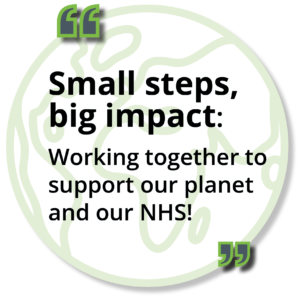What would £100,000 pay for?
It also equates to a day’s wages for more than 700 nurses, or more than 200 hospital consultants.
Small steps, big impact
There are things we can all do to help reduce waste:
- Resist the urge to over-order medicines: Check what medicines you have at home before you re-order, and only order what you really need when you need it
- Take control of your medication: Speak to your GP, pharmacy team or nurse about reviewing your medication to make sure they are still right for you
- Know how to dispose of unused medicines: If you have medicines at home that are out of date or no longer required, return them to your local pharmacy for safe disposal.
Take control of your medication – ask for a medicines review
Contact your GP practice and ask to be referred to the GP practice pharmacy team to discuss if your prescription is still right for you.
It is important that patients check in regularly to make sure the prescription they receive is right for them.
If you receive a repeat or serial prescription, contact your GP practice and ask to be referred to the GP practice pharmacy team for a medicines review, or ask your community pharmacist for advice.
Our pharmacy teams are here to help your with your medicines, and they will work with you to make sure the medications you receive are right for you.
As well as being beneficial for your care, medication reviews help reduce medicines waste.
Medicines Waste Across NHSGGC
Mythbusters
If I don’t use my medicines, I can return them for someone else to use
Medicines cannot be reused or recycled once they have been dispensed to you.
It’s OK for me to order extra medicines so I don’t run out
Over-ordering can lead to medicines going to waste if your prescription or health needs change. Please try to order only what you need, when you need it.
I’ve been taking these for years. I must still need them
If anything has changed with your health, you may not need some of your medicines anymore. Please contact your GP practice or pharmacist to arrange a medication review.
Prescriptions are free in Scotland. They don’t cost anything
Though you are not charged for your prescription medication, it still has a cost to the NHS, and the environment. It costs £11 on average for each individual medicine dispensed across Greater Glasgow and Clyde, and around 10% of the medicines dispensed, go to waste.
Resources for Staff






